During a stay in the Polish Catholic Mission in Maciaszkowo near Buenos Aires, Father Olaf suggested to us going to Lavallol to Ms. Krystyna Szuba. We were very curious about that contact because we knew that Ms. Szuba came to Argentina 60 years earlier, and before her life had been incredible. How many our compatriots living on the eastern area of the Second Polish Republic got to Soviet labor camps and together with the whole families were sent to Siberia. When the generals: Sikorski together with Anders began to create Polish Army the whole families went on a very long and strewn with dangers way. For many months of exile all around the Soviet Union two little brothers of Ms. Szuba died in Uzbekistan, and she suffered heavily from scurvy, she got paralyzed. There was an unimaginable hunger, children got to eat 400 grams of bread. During the short summer the diet was enriched by gathered in the forest berries and mushrooms. Harvesting raspberries, as Ms. Szuba reminisces, they had to be faster and smarter than bears. The first Holy Communion she received from Bishop Gawlina who visited Polish families in the Soviet Union and wept over their fate.
All Poles fleeing from the Soviet Union were transported by ship through the Caspian Sea to Persia. There awaited them another life, they got new clothes, much larger and more varied food portions, they got primary health care. Most importantly, little Krysia found her beloved ones: her mother and sister, from whom she was separated for health reasons in the Soviet Union. Together they went to Tehran and from there to Basra, where they were loaded onto a ship and transported to India. They spent a year there, to sail by boat from Karachi for another few years to Rhodesia. There was established a Polish community made up of women with children and older men unfit for military service. More than 2000 of our countrymen found shelter there. Half of them were children. A Polish school and scouting were established, and Krysia, as the oldest girl was a team leader, and later a troop leader. For years she led a diary, which with her consent, I present below.
After the war and the demobilization of soldiers from the Second Army of General Anders the father of Ms. Szuba emigrated to Argentina and brought there his loved ones. Since May 1948, when she sailed on a Dutch ship to Buenos Aires, her life has been permanently connected with Argentina. Here she had a family, here her children and grandchildren were born.
Looking back, she remembers the years spent in Africa as the most pleasant years of her life, it was a shelter from all dangers encountered earlier, there were her beloved ones: mother and sister. There was the Polish, patriotic spirit and education.
Today Krystyna Szuba is proud of the high state decorations which she was awarded with by two presidents, but she is not able to understand why she is refused to be granted the Polish citizenship. I also do not understand it, but I sincerely hope that someone on the Vistula River will finally use their head and give Ms. Krystyna Szuba what she has the full right to.
Jarosław Fischbach
Wszyscy Polacy uciekający ze Związku Radzieckiego byli transportowani statkami przez Morze Kaspijskie do Persji. Tu czekało ich inne życie, dostali nowe ubrania, a także znacznie większe i urozmaicone porcje żywieniowe, dostali podstawową opiekę medyczną. Co najważniejsze, mała Krysia odnalazła swoich najbliższych: matkę i siostrę, od których ze względów zdrowotnych była oddzielona u Sowietów. Razem pojechały do Teheranu, a stamtąd do Basry, gdzie załadowano je na statek i wywieziono do Indii. Tu spędziły rok, statkiem z Karaczi popłynąć na kilka kolejnych lat do Rodezji. Tu założono polskie osiedle, w którym mieszkały kobiety z dziećmi oraz starsi mężczyźni, którzy nie nadawali się już do służby wojskowej. Schronienie znalazło tu ponad dwa tysiące naszych rodaków. Połowę z nich stanowiły dzieci. Powstała polska szkoła, utworzono polskie harcerstwo, a Krysia jako najstarsza dziewczynka została drużynową, a później hufcową. Przez lata prowadziła swój dziennik, który poniżej, za zgodą pani Krystyny, prezentuję.
Po zakończeniu wojny i demobilizacji żołnierzy z II Armii generała Andersa, ojciec pani Krystyny wyemigrował do Argentyny i ściągnął tu swoich najbliższych. Od maja 1948 roku, kiedy przypłynęła holenderskim statkiem do Buenos Aires, swoje losy związała na stałe z Argentyną. Tu założyła rodzinę, tu przyszły na świat jej dzieci i wnuki.
Sięgając pamięcią wstecz pani Krystyna najmilej ze swojego życia wspomina lata spędzone w Afryce, było tu schronienie przed wszelkimi wcześniej spotykanymi niebezpieczeństwami, byli najbliżsi: matka i siostra. Był polski patriotyczny duch i wychowanie.
Dziś pani Krystyna jest dumna, że od dwóch prezydentów dostała wysokie odznaczenia państwowe, ale nie jest w stanie zrozumieć dlaczego odmawia się jej przyznania obywatelstwa polskiego. Ja też tego nie rozumiem, ale mam szczerą nadzieję, że ktoś nad Wisłą w końcu ruszy głową i zdąży oddać pani Krystynie to, do czego ma pełne prawo.
Jarosław Fischbach
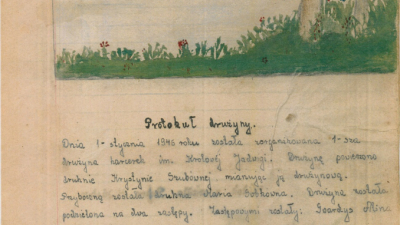
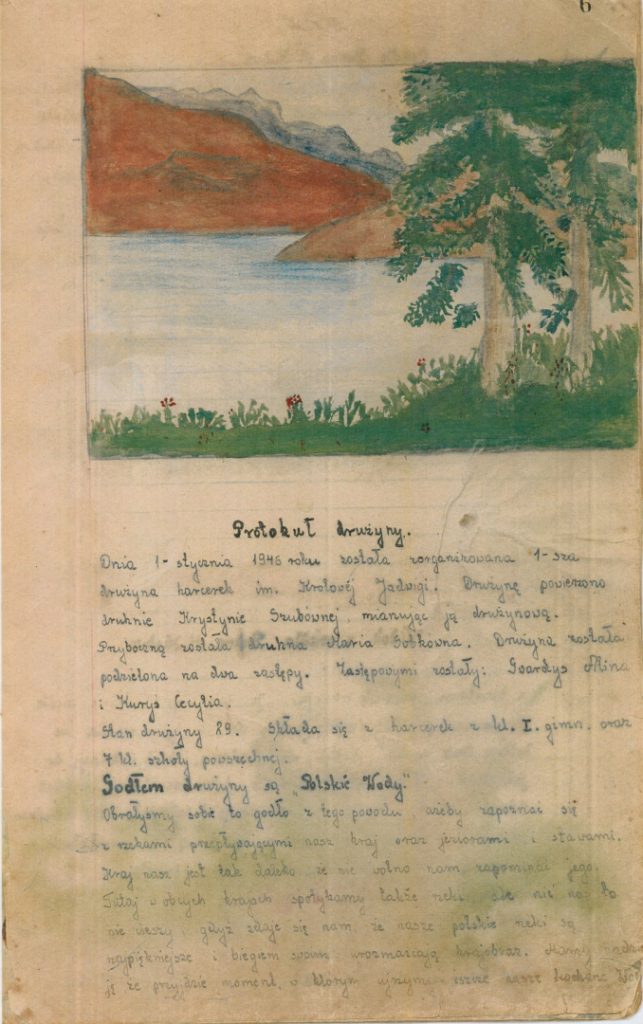
The team protocol On 1 January 1946 the first Queen Jadwiga scout team was formed. The team was entrusted with Krystyna Szubówna, who was appointed the team leader. The team was divided into two patrols. The patrol leaders were Alina Gwardys and Cecylia Kuryś. The team consisted of 29 members, scouts from the first class of intermediate school and the seventh grade of primary school. The emblem of the team is "Polish waters". We chose this emblem to get familiar with the rivers flowing in our country as well as lakes and ponds. Our country is so far away that we mustn’t forget it. Here in foreign countries we also see rivers, but we aren’t happy about them, because it seems to us that our Polish rivers are the most beautiful and they diversify our landscape. We hope that the moment will come when we will see again our beloved waters.
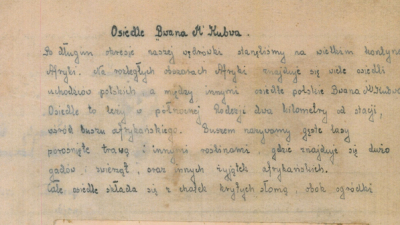
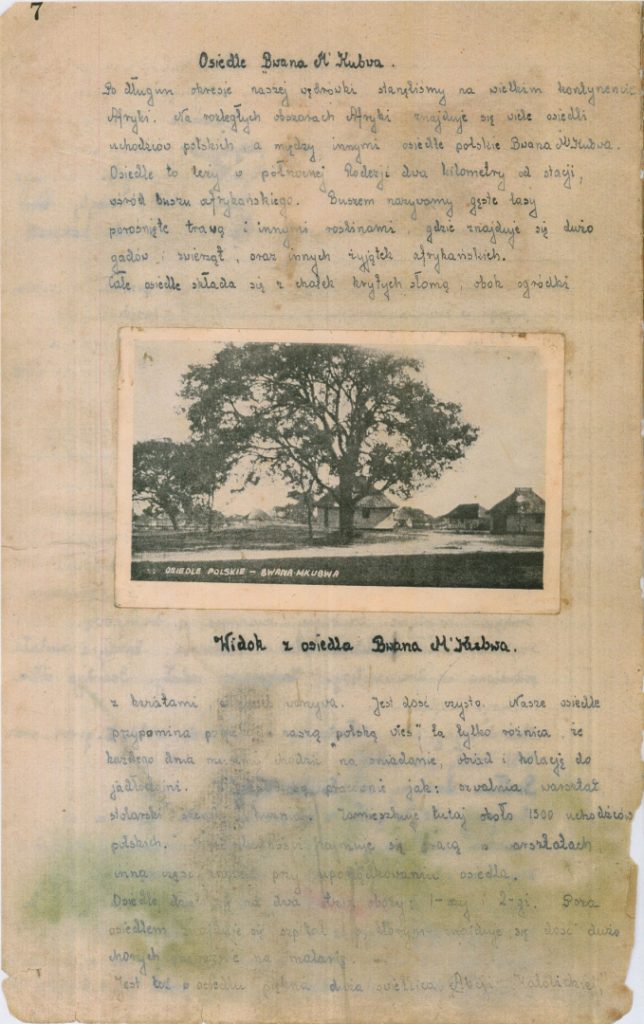
Bwana M`Kubwa settlement
After a long period of our journey we stood on the great continent of Africa. On the vast areas of Africa there are many settlements of Polish refugees, and among others, Polish settlement Bwana M`Kubwa. The settlement is located in northern Rhodesia, two kilometers from the station, among the African bush. By the bush we mean dense forests overgrown with grass and other plants, with many reptiles and animals and other African tiny living things. The entire settlement consists of thatched huts, next there are gardens with flowers and even vegetables. It's pretty clean. Our settlement resembles (..... an illegible word) our "Polish village", the only difference is that every day we have to go to a canteen for breakfast, lunch and dinner. In the settlement there are workrooms, such as sewing room, carpentry workshop, shoemaker, blacksmith. About 1500 Polish refugees live here. Part of the population is engaged in work in the workshops, another part neatens the settlement.The settlement is divided into two (an illegible word) camps: the first and the second. Outside the settlement is a hospital, with quite many patients, usually ill with malaria. In the settlement there is also a beautiful large common room of "Catholic Action",

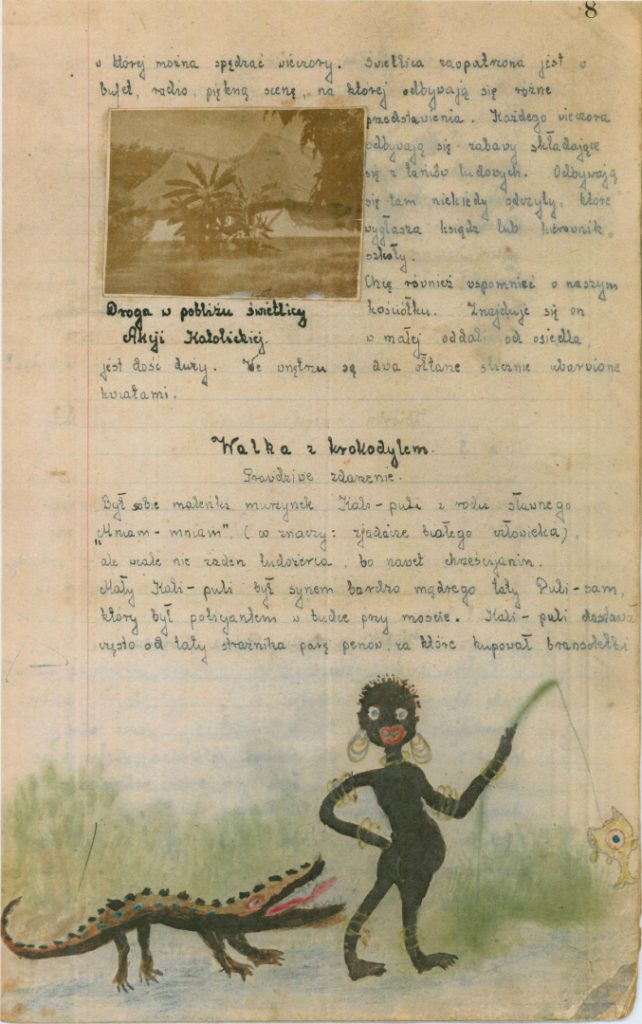
where you can spend evenings. The common room is equipped with a buffet, radio, beautiful scene, where are held various performances. Every evening are folk dance plays. There are sometimes held readings delivered by the priest or the head of the school.
I also want to mention our church. It is located in a small distance from the village, it is quite big. Inside are two altars beautifully colored with flowers.
Fight with a crocodile.
Real event.
There was a little black boy Kali – puli from the famous tribe of "Yum - yum" (which means white man eaters), but he is not any man-eater, because he is even a Christian. Small Kali - puli was the son of a wise father Puli - sam, who was a policeman in the booth at the bridge. Kali - puli often got from his dad a couple of pens, for which he bought bracelets,
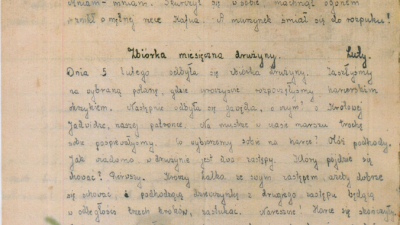
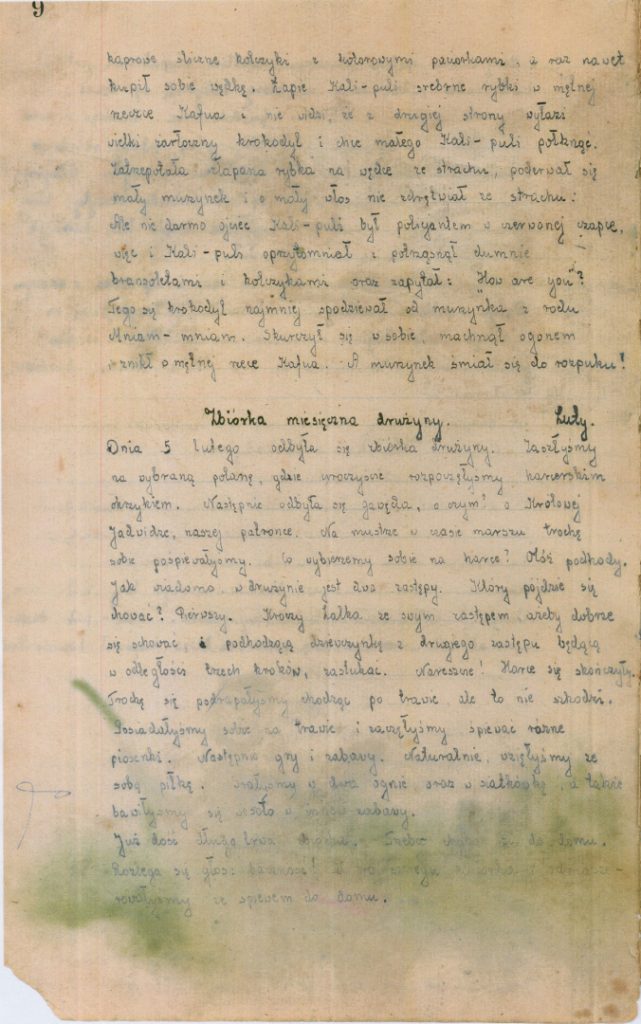
beautiful cornflawer earrings
with colored beads, and once he even bought a fishing rod. Kali – puli catches silver fish in a muddy little Kafua river and cannot see that from the other side creeps out a great voracious crocodile and wants to swallow little Kali - puli. The little fish caught on rod shrank with fear, the little black boy jumped up and was almost frozen with fear: But not in vain Kali – puli’s father was a policeman with a red cap, so also Kali - puli came to his senses and shook proudly bracelets and earrings, and asked: How are you? That was what the crocodile expected least from the black boy from the Yum – yum tribe. He shrank into himself, waved his tail and disappeared into the murky Kafua river. The black boy laughed heartily!
A monthly meeting of the scouting team February
On 5 February was held a team meeting. We came to the selected clearing, where we solemnly started with a scout exclamation. Then there was a tale, about what? about Queen Jadwiga, our patroness. At the square-bashing during the march we were singing a little. What will we choose for
frolics? Well, paper chase. As it’s known in the team there are two patrols. Which one will go to hide? The first one. Doll is stepping with her troop, to hide well and tap an aproaching girl from the other patrol
three steps ahead. Finally! The game is over. We scratched our skin a bit when we were walking through the grass, but it does not matter. We sat on the grass
and began singing different songs. Then fun and games. Naturally, we took a ball. We played dodgeball and volleyball and other games.
The meeting lasted quite long. We need to go home. We hear a voice: attention! Assembly, and we marched off singing and heading for home.
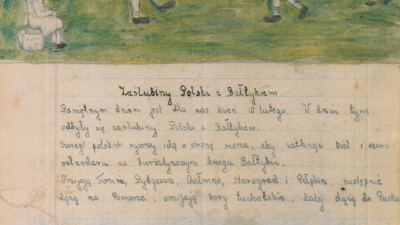
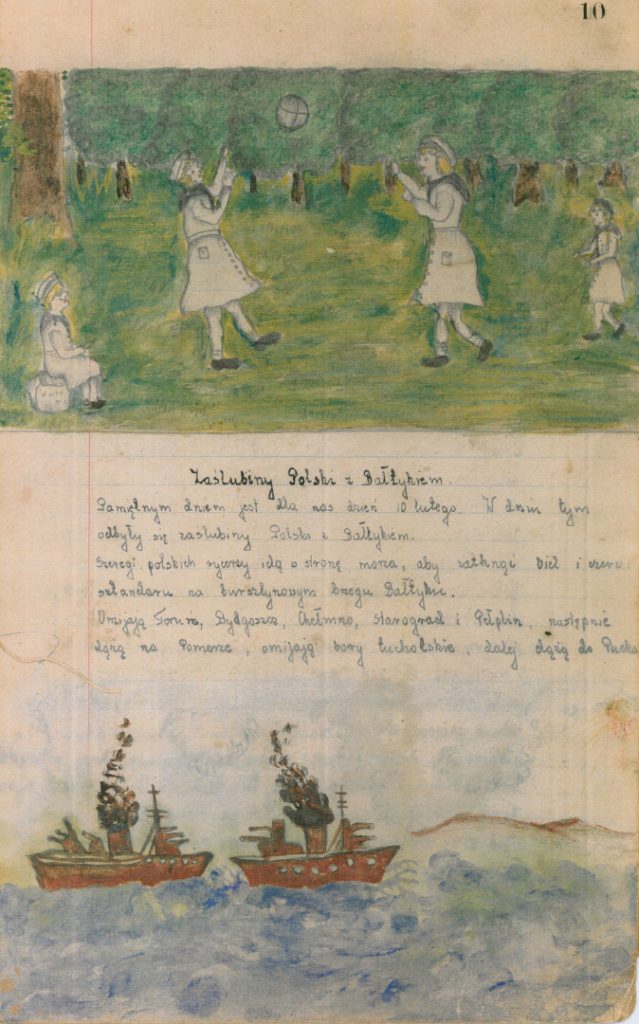
Poland's Wedding to the Sea
10th February is a memorable day for us. On that day Poland's Wedding to the Sea took place.
The ranks of Polish knights are going towards the sea to ram the white and red flag on the amber shore of the Baltic Sea.
They pass Toruń, Bydgoszcz, Chełmno, Pelplin and Starogard and then head for Pomerania, pass Bory Tucholskie National Park, continue to Puck,
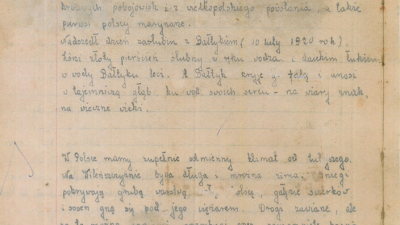
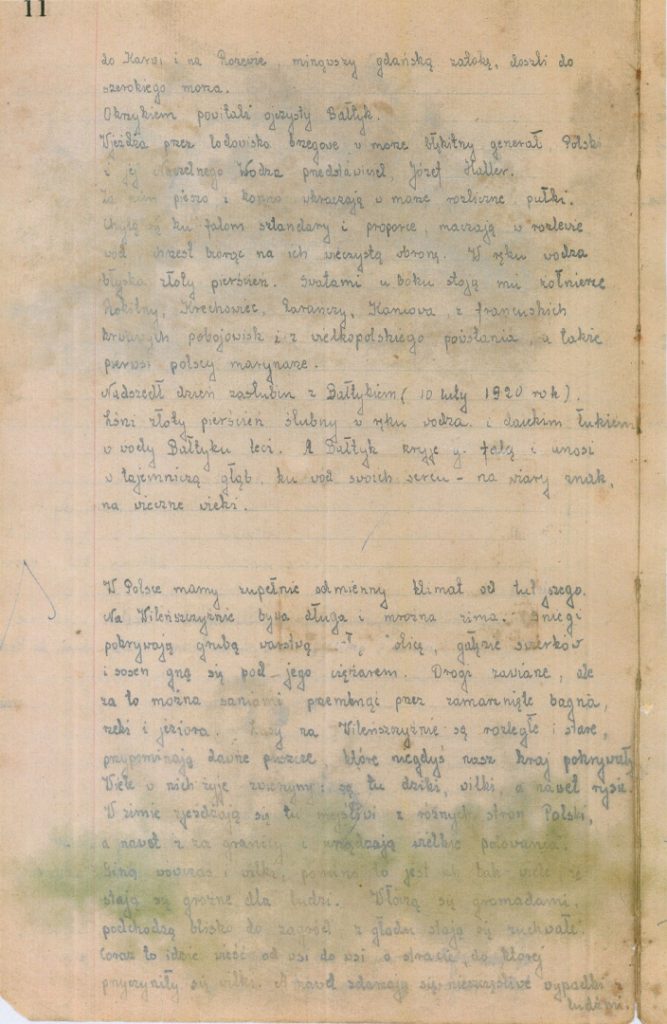
to Karwia and Rozewie, having the Bay of Gdańsk passed, reached the wide sea.
They greeted the native Baltic Sea with an exclamation.
Through the boundary rink enters the blue General, of Poland, and the representative of the Commander in Chief, Józef Haller.
Behind him, on foot and on horseback numerous regiments enter the sea. Flags and pennant bend towards the waves, dip in the water, being christened in the name of their eternal defense. In the hands of the chief a gold ring is flashing. The knights: Rokitny, Krechowiec, Rarańczy, Kaniowa from the French bloody battlefields and the Greater Poland uprising, as well as the first Polish sailors stand next to him. It’s the day of Poland's Wedding to the Sea (February 10, 1920). A gold wedding ring shines in the hand of the commander
and flies with a distant arc in the waters of the Baltic. And the Baltic covers it with its wave and it floats in the mysterious depths, to the waters of its heart – in faith, for the eternal ages.
In Poland we have a completely different climate than the one here. In the Vilnius region the winter is sometimes long and cold. The surrounding area is covered with a thick layer of snow, branches of spruce and pine trees bend under its weight. The roads are snow-draped, but you can slip by sleigh across the frozen marshes, rivers and lakes. The forests in the Vilnius region are extensive and old, they resemble the old forests that once covered our country. Many animals live here: wild boars, wolves and even lynx. In winter,
hunters from different parts of Poland and even from abroad come here and arrange the big hunt. Then
the wolves perish, although there are so mary of them that they become dangerous to humans. They roam in groups, come up close to the enclosures, hunger makes them bold. The news about losses caused by the wolves go from village to village. And there even happen accidents with people. It al does not mean anything, however. In the African climate we will not behold this beautiful fluffy snow and will not make a snowman or play snowballs. Here there are only rains that harm our health, or the burning sun so that you cannot go out to the field without headwear.
The animals here are much more dangerous. In the African wilderness live lions, leopards, which lunge at a man as well as many, many other creatures that threaten our lives.
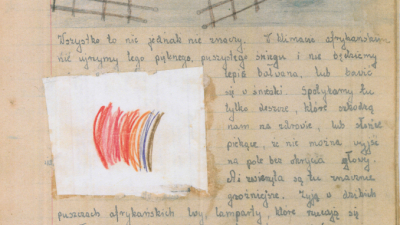
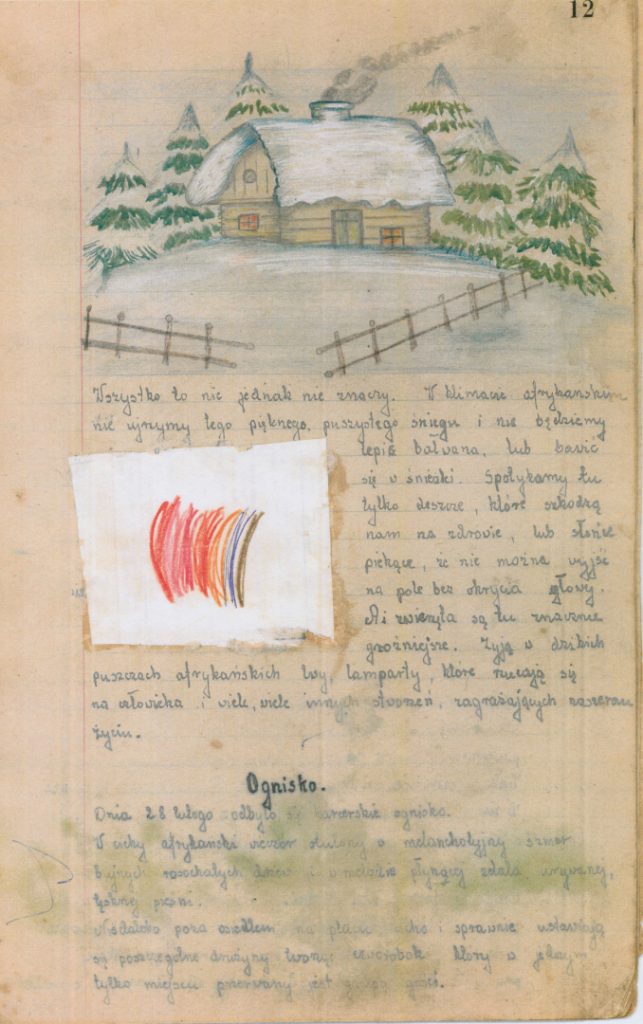
It all does not mean anything, however. In the African climate we will not behold this beautiful fluffy snow and will not make a snowman or play snowballs. Here there are only rains that harm our health, or the burning sun so that you cannot go out to the field without headwear.
The animals here are much more dangerous. In the Africa wilderness live lions, leopards, which lunge at a man as well as many, many other creatures that threaten our lives.
Campfire
On 28 February there was a scout campfire. In the quiet African evening shrouded in a melancholic murmur of lush, furcate trees and in the melodies of broken, yearning songs from far away.

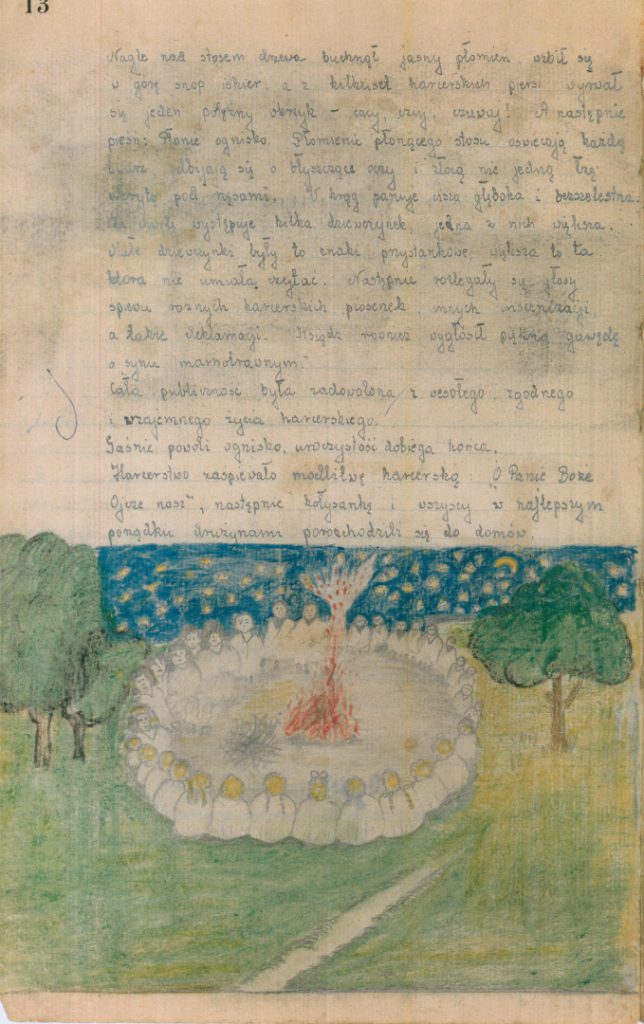
Not far outside the settlement, at the square quietly and agilely, teams position to create a quadrangle, which in only one place is interrupted by a group of guests.
Suddenly over the pile of wood burst a bright flame, sparks flew up, and from several hundred scout songs flew one mighty cry – Stay vigilant! And then the song: The campfire’s burning. The flames of the burning pile enlighten each face, reflect against the shiny eyes and gilden not one tear hidden under the lashes. In the circle there is a deep and noiseless silence. (... an illegible word) while some girls come forward, one of them bigger. The little girls were punctuation marks, the bigger is the one who could not read. Then voices singing different scout songs, other staging and declamations could be heard. The priest also delivered a beautiful tale about the prodigal son."
The whole audience was pleased with the cheerful, agreeable and mutual scout life.
The campfire is slowly going out, the celebration comes to an end.
The scouts sang the prayer: "Oh Lord God our Father," then a lullaby and everybody, in perfect order, team after team went to their homes.

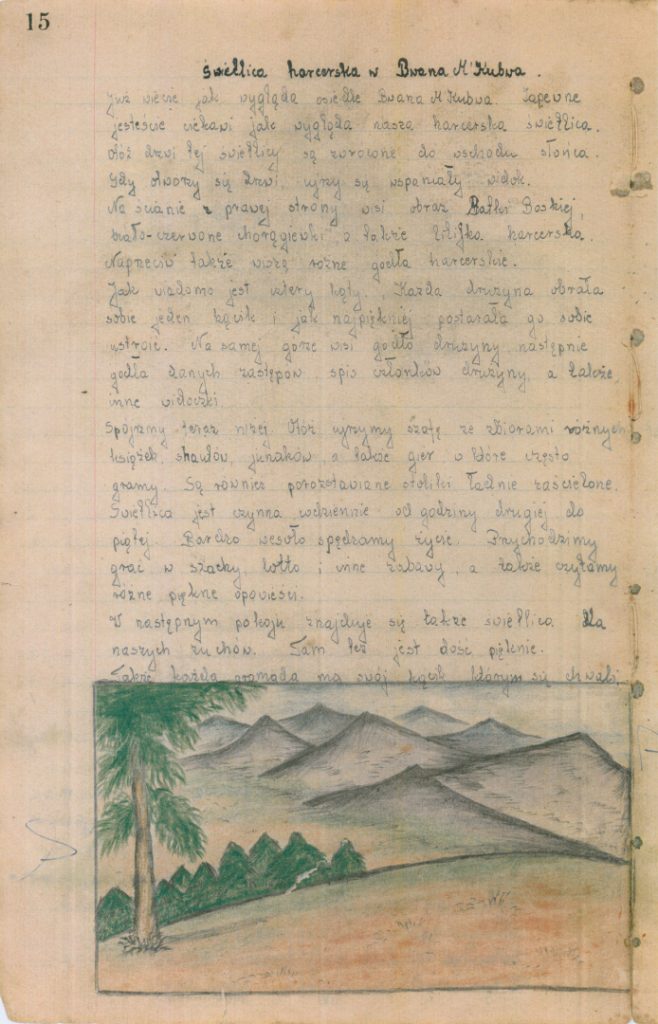
Common scout room in Bwana M`Kubwa.
Now you know what Bwana M`Kubwa settlement looks like. Perhaps you are curious what our scout common room looks like. Well, the door of the common room is facing the sunrise. When you open the door, you will see a great v. On the wall on the right side hangs a painting of the Mother of God, white and red flags, as well as a scout lily. Opposite there hang various scout emblems.
As it is known there are for corners. Each team chose one corner and tried to
decorate it as beautifully as possible. At the very top hangs the emblem of the team, then the emblems of individual patrols, a list of team members, as well as other views.
Now let’s look below. Well, we will behold a wardrobe with collections of various books and games that we often play. There are also set up nicely laid tables. The common room is open every day from two to five. We spend life very cheerfully. We come to play chess, lotto and other games, as well as read various beautiful stories.
In the next room there is also a common room for our scouts. It is also quite beautiful. Also, each team has their own area, which they boast about.

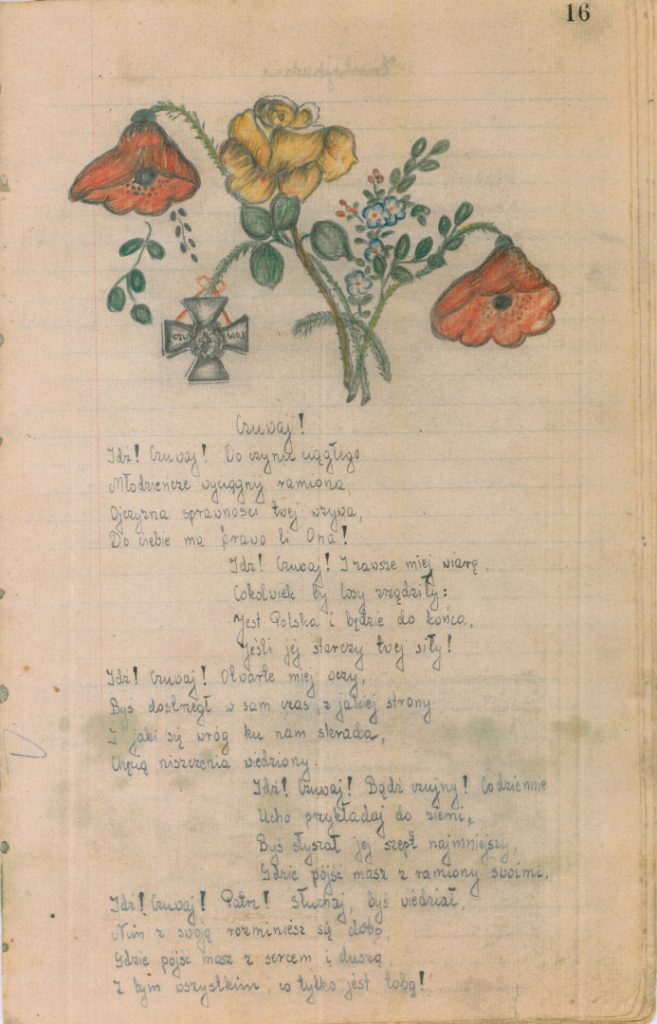
Stay vigilant!
Stay vigilant!
Go on! Stay vigilant! For continuous effort
Spread your arms, young man,
Your motherland calls for your fitness,
She has the right to you, now and then!
Go on! Stay vigilant! And always keep the faith,
For anything that fate would decide:
There's Poland and till the end will be,
As long as there's you on her side!
Go on! Stay vigilant! And keep your eyes open,
To see clearly on time from which side
and what enemy's creeping to us,
With will to destroy our kind.
Go on! Stay vigilant! Be alert! Every day
Keep putting your ear to the ground,
To hear its most silent whisper,
Telling you where to go with your arms.
Go on! Stay vigilant! Look! Listen so you know,
Before you miss out on your own days,
Where to go with your heart and soul,
With all that makes up you and your ways!
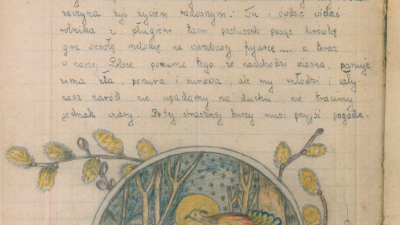
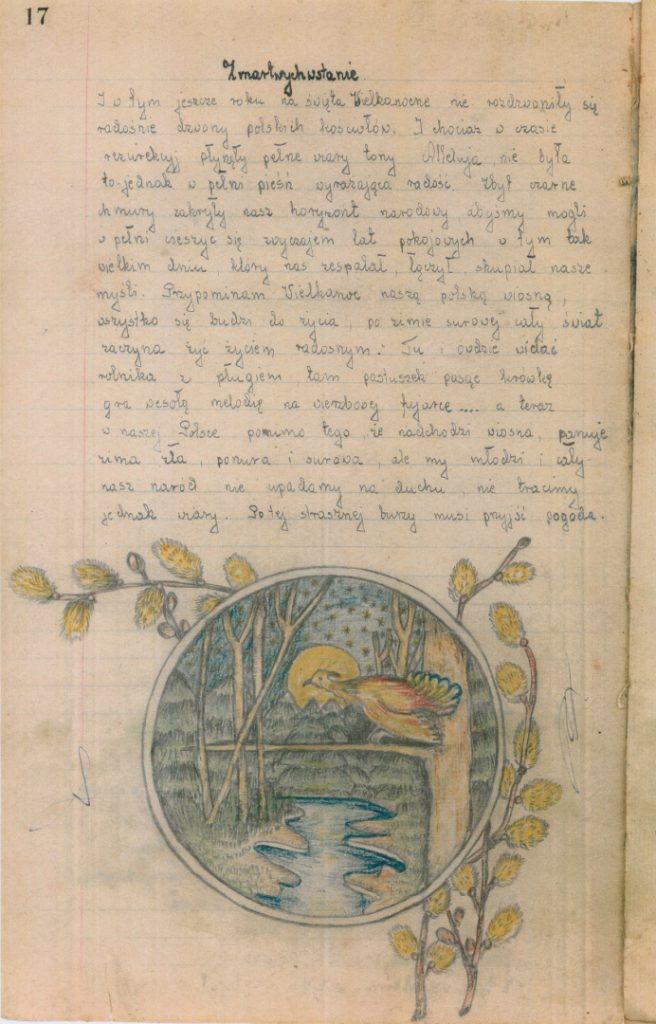
Resurrection.
And this year for Easter the bels of our Polish churches hasn’t rung yet. And althoug during the resurection flowed full of faith tons of Hallelujah, it was not, however, a song fully expressing only the joy. Too dark clouds covered the horizon of our nation to be able to fully enjoy the custom of the years of peace on this such a great day, which brought us together, focused our thoughts. I recall our Polish Easter with spring, everything wakes up to life, after winter the whole frosty world starts to live a happy life. Here and there you can see a farmer with a plow, there a shepherd pasturing a little cow plays a cheerful melody on the willow flute ... and now in our Poland, although the spring is coming, there is a bad, bleak and harsh winter, but we, the young, and our whole nation do not lose heart and do not lose faith, however.
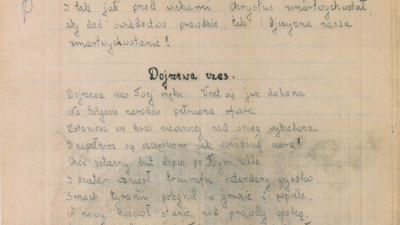
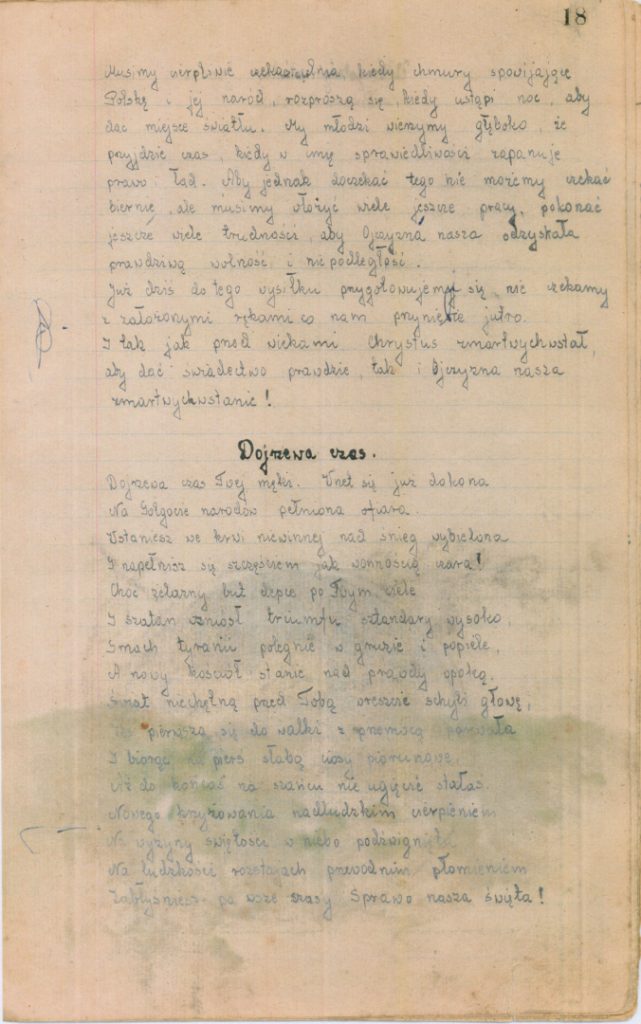
After this terrible storm must come a good weather. We must wait patiently for the day when the clouds enveloping Poland and its people will disperse, when the night will be over, to give place to the light. We, young people believe deeply that the time will come when, in the name of justice, law and order will prevail. However, looking forward, we can not wait passively,
but we need to put a lot more work yet to overcome many difficulties, so that our homeland will regain real freedom and independence.
Even today we prepare to this effort, do not sit around waiting for what tomorrow will bring.
And just as centuries before Christ resurected to give witness to the truth, so our Homeland will resurrect as well!
Time gets mature.
Time of your pain gets mature. Soon, sacrifice will show
Performed on the Golgotha of nations in favour.
You will rise in innocent blood whitened over the snow
And get filled with joy like a wine-cup with savor!
Though an iron boot over your body treads,
And Satan's holding the triumphal banners high up,
In rubble and ash will tyranny building be dead,
And a new church will be founded on the truth bedrock.
The world will finally bow for you its unwilling head,
For you were the first to go fighting against violence
Facing thunderbolts with your weakening chest instead
And continued on the bulwark right until the end.
Unbearably suffering from new crucifiction
Lifted to the heights of holiness in heaven
At humanity crossroads, with guiding flame diction
Our holy cause, you shall be shining forever!
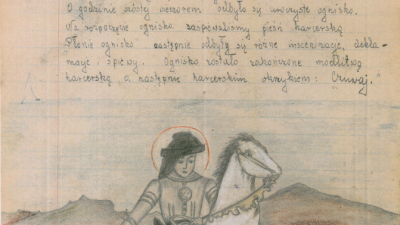
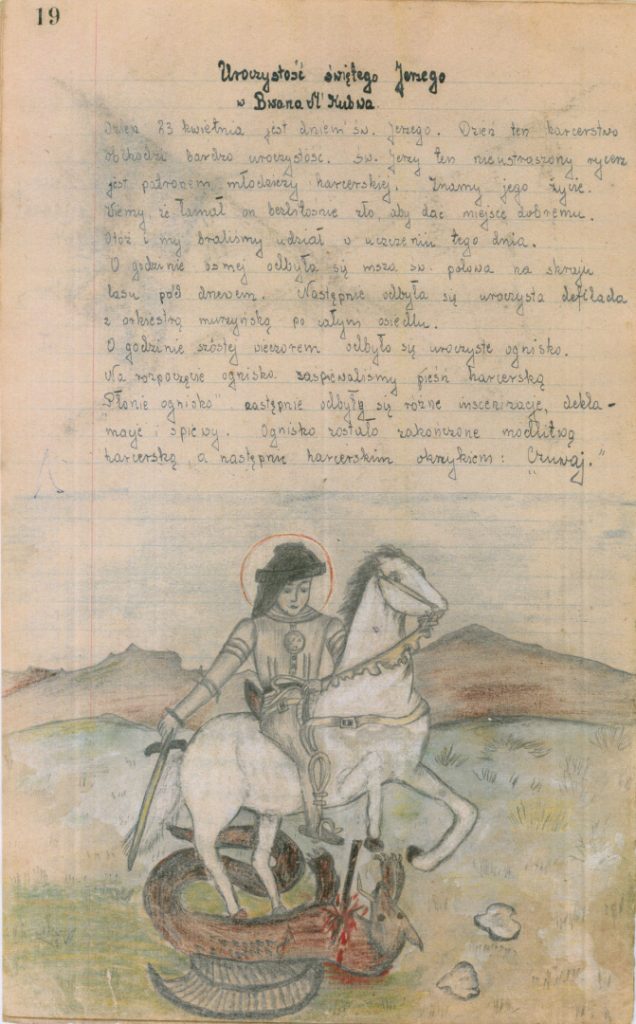
St. George celebation
In Bwana M`Kubwa
23 April is the day of St. George. This day is celebrated very much by the scouts.
St. George, this fearless knight, is the patron of scout youth. We know his life.
We know that he broke ruthlessly evil, to give place for the good. Well, we also took part in the celebration of this day. At eight o'clock the Mass was held on the edge of a forest under a tree. This was followed by a solemn parade of the black orchestra throughout the settlement.
About six in the evening there was a ceremonial campfire. At the beginning of the campfire we sang the song " The campfire’s burning ", then there were various declamations, staging and singing. The campfire was finished with a scout prayer and the scout exclamation "Stay vigilant!"
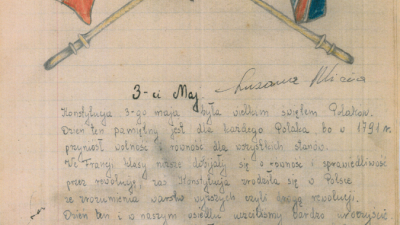
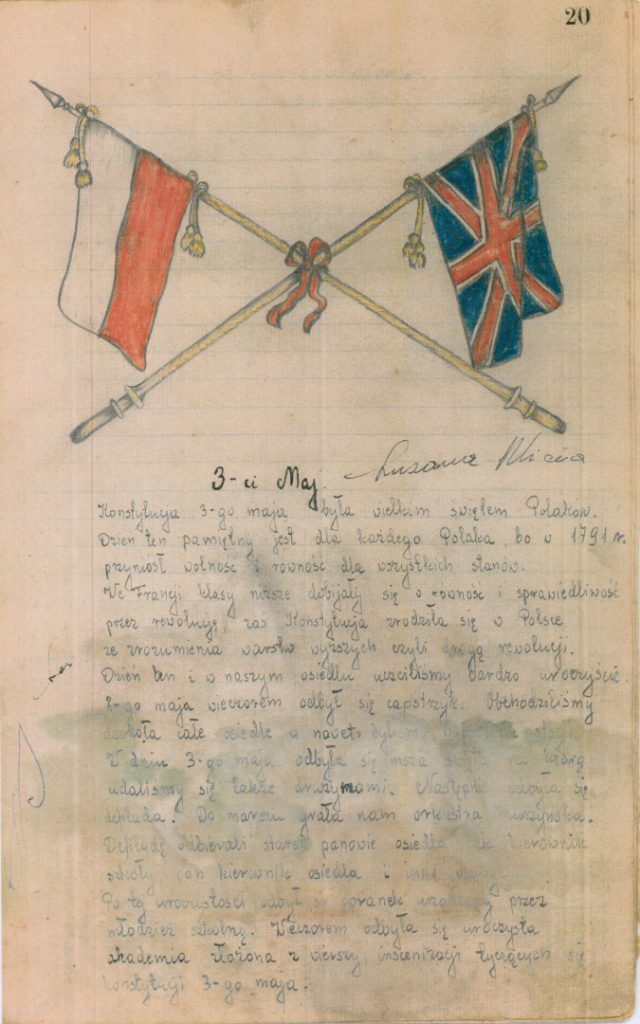
The Constitution of 3 May was a great celebration of the Poles. This day is memorable for every Pole, because in 1791 it brought freedom and equality for all states.
In France, the lower classes were striving for equality and justice by the revolution, and the Constitution was born in Poland out of understanding of the higher classes, so by the revolution. This day was celebrated also in our settlement with great solemnity. On the 2nd of May in the evening was held a tattoo. We walked around the whole settlement, and we were even near the station. On May 2, there was held a mass, to which we also went in teams. This was followed by a parade. To the march played the black orchestra. The parade was attended by elderly gentlemen from the settlement, such as the head of the school, the head of the settlement and others.
After the ceremony there was held the morning prepared by schoolchildren. In the evening there was an assembly with poems, staging about the constitution of the 3rd of May.
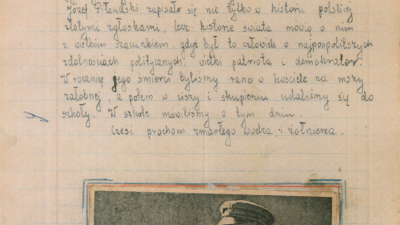
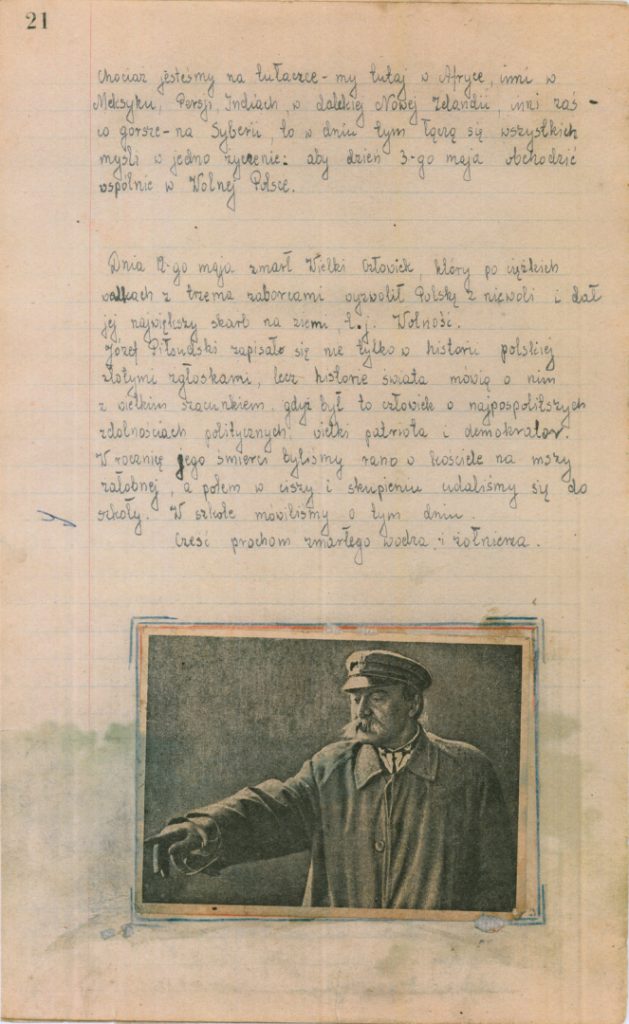
Although we are in exile - we here in Africa, others in Mexico, Persia, India, in distant New Zealand, and others – what is even worse - in Siberia, on this day the thoughts of everybody unite in one wish: to celebrate the day of 3rd of May togeter in Free Poland.
On 12th of May died a Great Man, who after a heavy fight with the three aggressors, freed Poland from slavery and gave it the greatest treasure on earth - Freedom.
Józef Pilsudski went down not only in history of Poland, but also in history of the world,
where he is remembered with great respec, because he was a man of uncommon political abilities, a great patriot and democrator. On the anniversary of his death on Sunday morning we were at the requiem, and then in silence and concentration we went to school. In school we talked about that day.
Glory to the ashes of the deceased leader and soldier.
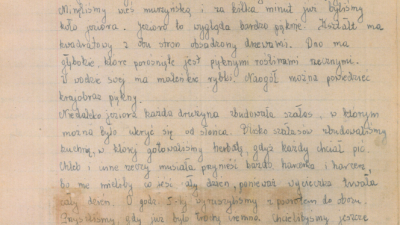
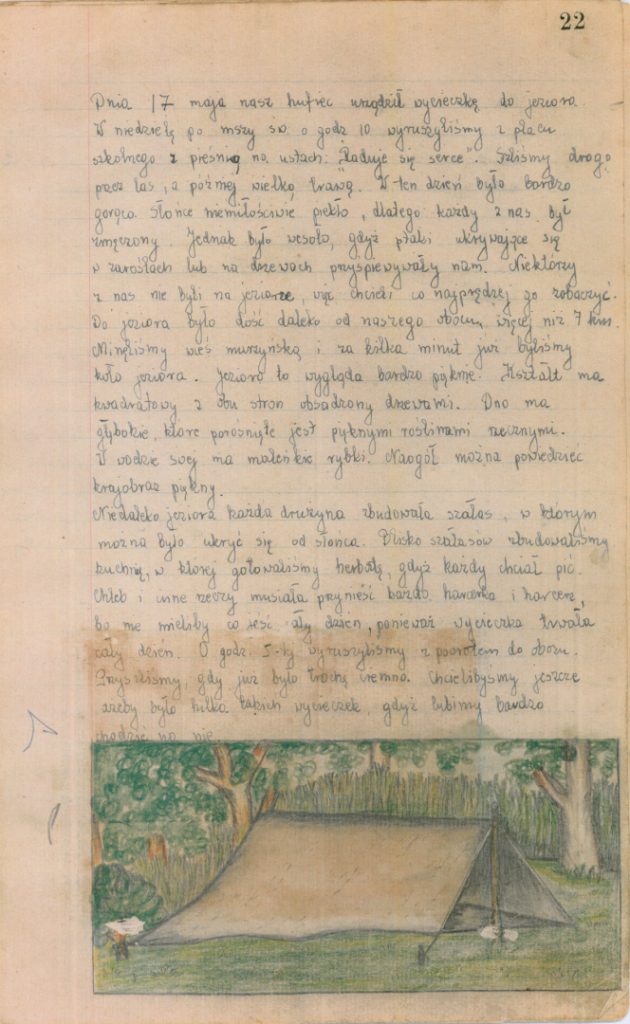
On 17 May, our troop organized a trip to the lake. On Sunday, after the mass at 10 pm we left the school grounds with the song "The heart rejoices" on our lips. We walked through the forest, and then a big grass. The day was very hot. The sun was burning no-graciously, so everyone was tired. But it was fun, because the birds hiding in the bushes or in trees sang to us. Some of us haven’t been to the lake, so they wanted to see it as so[on as possible. It was quite far to the lake from our camp, more than 7 km. We passed the village, and in a few minutes we were already near the lake. The lake looks very beautiful. It is square-shaped, on both sides planted with trees. The bottom is deep, covered with beautiful river plants. In the water there are tiny fish. Generaly you can say - beautiful landscape.Near the lake each team built a hut, where we could hide from the sun. Near the huts we built a kitchen where we cooked tea, because everyone wanted to drink. Every scout had to bring bread and other things, because we wouldn’t have had anything to eat all day, because the trip lasted all day. At 5 we headed back to the camp. We came when it was a little dark. We would like to have several more such trips because we like going for them.
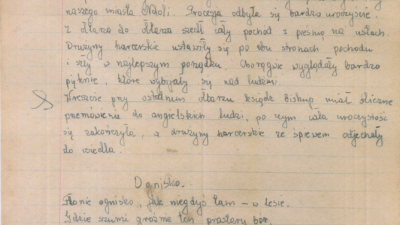
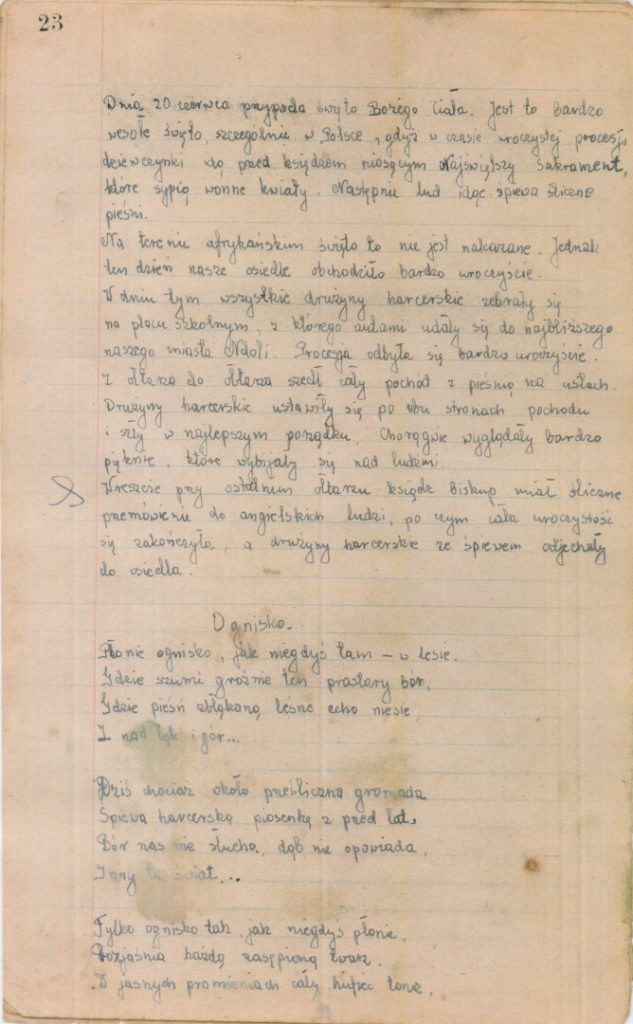
June 20 is Corpus Christi. It is a very happy holiday, especially in Poland, as in a solemn procession girls go in front of the priest who carries the Blessed Sacrament, and they pour down fragrant flowers. Then the people sing beautiful songs.
In African area this celebration is not dictated. But this day woke up our settlement very early. On that day all the scout teams gathered in the square schoolyard, from where they went in cars to our nearest town of Ndola. The procession took place very solemnly. The procession
went from altar to altar with a song on their lips. The scout teams lined up on both sides of the procession and walked in as best order as they could. The flags looked very beautiful, which stood above the people. Finally, at the last altar, the Bisop delivered a beautiful speech to the English people, after which the whole ceremony ended, and the scout teams retured to the settlement singing.
Campfire
Campfire's burning like once there in the wood,
Where the old trees make a threatening sound,
Where the echo carries a song lost for good
From meadows and mounts...
Although today a beautiful bunch around
Sings a scout song that survived many years,
Forest won't hear us, oak wouldn't give a sound,
Another world's here...
Only the campfire's burning like before,
Lightens every saddened and gloomy face.
In bright flames the whole troop is sinking onshore
This faithful watch stays...

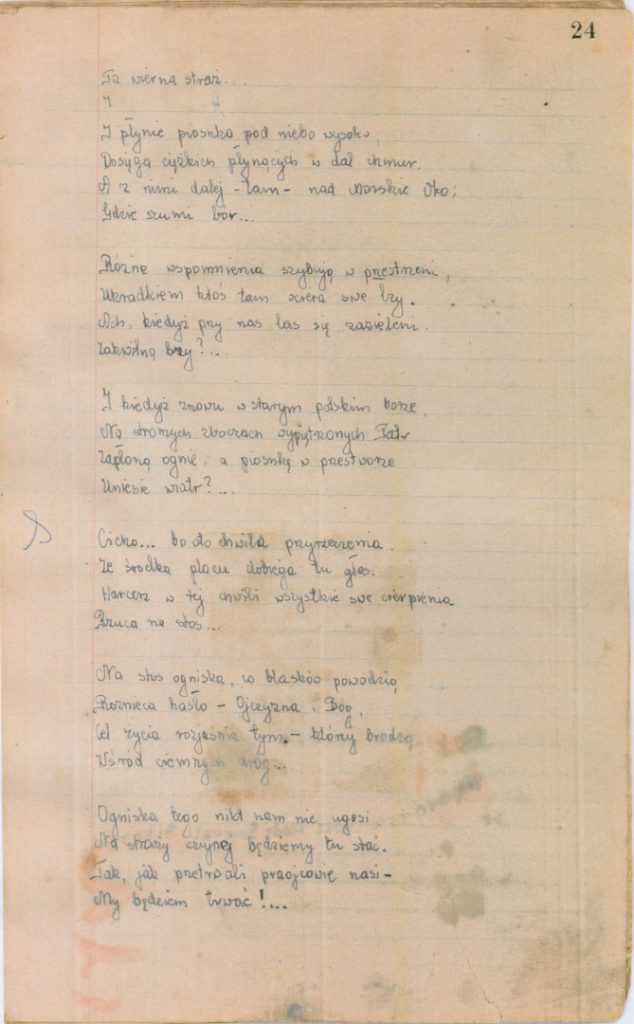
This faithful watch stays...
This faithful watch stays...
And the song flows fairly high into the sky,
Reaching heavy clouds that float far away,
And with them to Morskie Oko will fly
Where tree noise will play...
Different memories are gliding in the space,
Somebody's drying their tears behind the door.
Oh, when will the forest show us its green face
And tears will bloom more?...
And when will in old Polish forest again,
On the hilly slopes of Tatras uplifted,
Fire be lit and the song go off the chain,
Wind airlifted?
Silence... for now is the moment of a vow,
A voice coming from the middle of the square.
A scout throws away all his suffering now
On the stack right there.
On the campfire stack that with flood of flash
Lightens up the slogan - Fatherland and God,
Clarifies the goal of life for those who dash
Among dark roads odd...
No one shall extinguish from us this fire,
For we will stand here with a most watchful guard
Like our ancients who have never expired -
We shall stand up hard!...
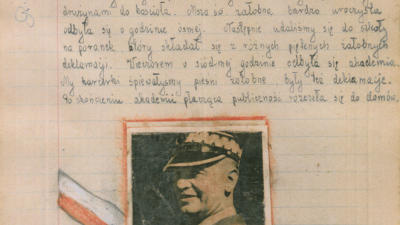
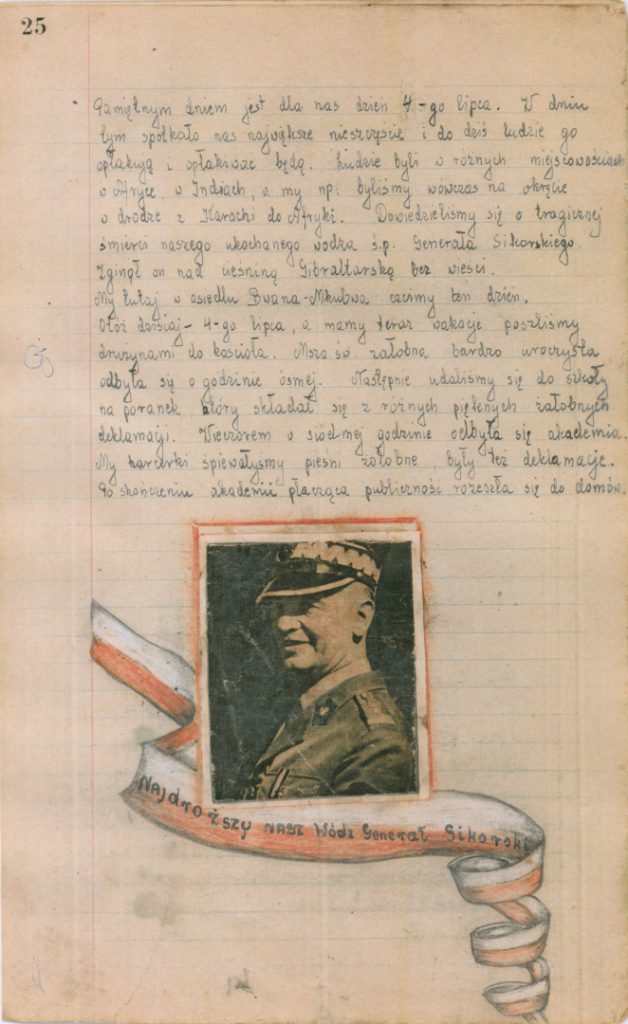
The 4th of July is a memorable day for us. On that day a great
calamity happened to us and until today people mourn it and will mourn. People were in different places in
Africa, in India, and we, for example, were then on the ship on the way from Karachi to Africa.
We learned about the tragic death of our beloved commander, late General Sikorski. He disappeared without a trace at the Straits of Gibraltar.
We here in the settlement of Bwana Mkubwa celebrate this day.
Well, today – 4th of July, and we now have holidays, went in teams to church. The requiem very solemn was held at eight o'clock. Then we went to school for the morning, where we had a variety of beautiful, mourning declamations. In the evening at seven o'clock was the assembly. We, girls scouts sang mourning songs, there were also declamations. After the assembly was over, the weeping audience went homes.
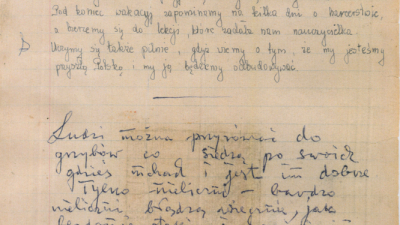
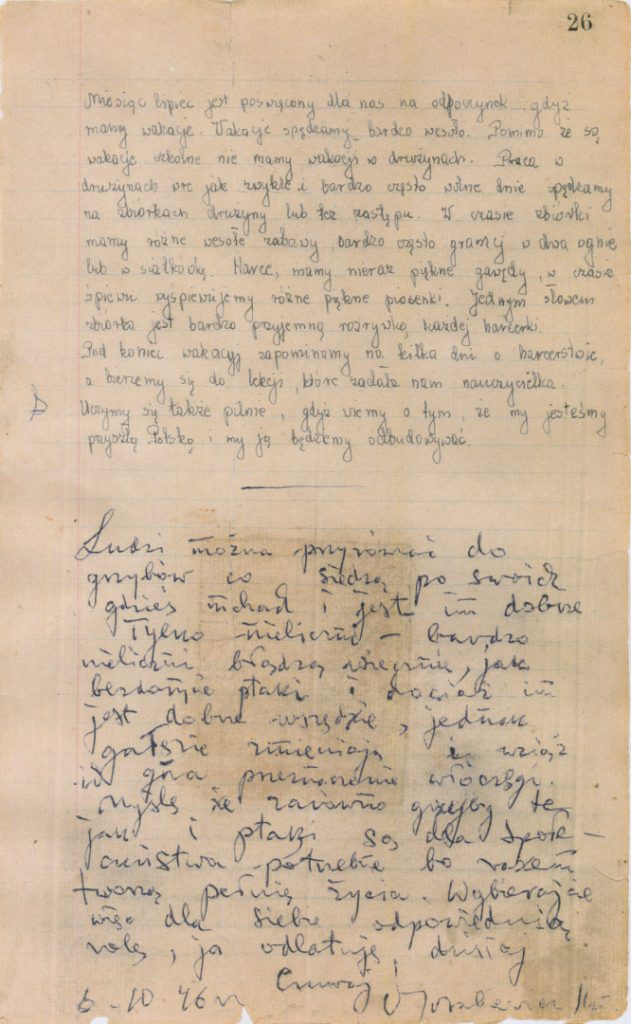
The month of July is dedicated for us to rest, because we have holidays. We spend holidays very cheerfully. Although there are school holidays we do not have holidays in teams. We work hard in teams as usually, and very often we spend free days on team or patrol meetings. At the time of the meetings we have a variety of fun games, often playing dodgeball or volleyball. Frolics, sometimes we have beautiful tales, and sing a variety of beautiful songs. In short, the meetings are very pleasant entertainment for every scout girl. At the end of the vacatio we forget for a few days about scouting, and we get onto the homework that the teacher asked us to do. We also learn diligently, because we know that we are the future of Poland and it is we who will rebuild it.
People can be compared to mushrooms which sit somewhere (.... I cannot read the word) and they are fine. Only few - very few people wander forever, like homeless birds, and although they are fine everywhere, they change branches are all the time, they skirr, the destiny of a vagrant. I think that both mushrooms and these birds are needed for the society because together they form the fullness of life. Therefore choose for yourself the apropiate role, as I'm leaving today
Stay vigilant!
06.10.1946



